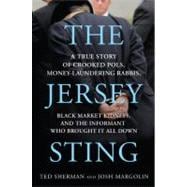
Note: Supplemental materials are not guaranteed with Rental or Used book purchases.
Purchase Benefits
What is included with this book?
| Prologue | p. 1 |
| Everyone in New Jersey Was Arrested Today … | p. 7 |
| The Rabbi's Son | p. 22 |
| The Schnookie Deal | p. 41 |
| You Have No Idea What You're Messing With … | p. 65 |
| ôDo I Really Want to Get in Bed with This Guy?ö | p. 80 |
| Point of No Return | p. 92 |
| Mike from Monsey | p. 103 |
| Religious Retreat | p. 123 |
| Kidneys and Fish | p. 136 |
| The Fixer | p. 156 |
| The Man from Chicago | p. 176 |
| The Stripper, the Mayor, and the Manzo Boys | p. 188 |
| March Madness | p. 207 |
| Hudson County Hardball | p. 229 |
| Put Him on Ice … | p. 248 |
| Takedown | p. 280 |
| Rogues and Cronies of Thieves | p. 303 |
| ôI Am Guilty, Your Honor …ö | p. 311 |
| Epilogue | p. 337 |
| Chapter Notes | p. 343 |
| Cast of Characters and the Roles They Played | p. 355 |
| Bibliography | p. 361 |
| Acknowledgments | p. 363 |
| Index | p. 371 |
| Table of Contents provided by Ingram. All Rights Reserved. |
The New copy of this book will include any supplemental materials advertised. Please check the title of the book to determine if it should include any access cards, study guides, lab manuals, CDs, etc.
The Used, Rental and eBook copies of this book are not guaranteed to include any supplemental materials. Typically, only the book itself is included. This is true even if the title states it includes any access cards, study guides, lab manuals, CDs, etc.